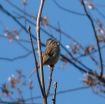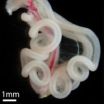(Press-News.org) While singing the same songs as your neighbours may sound harmonious, research conducted at Queen's University Biological Station (QUBS) suggests that song-sharing amongst song sparrow populations is actually an aggressive behavior, akin to flinging insults back and forth.
"It's been hypothesized that repertoire size and song complexity is about the singer's ability to advertise their quality as a mate," says lead author Janet Lapierre, a visiting biologist from the University of Western Ontario (UWO). "Song-sharing, where birds sing a smaller number of their species' greatest hits, is a more aggressive and attention-seeking behaviour. It's also a behaviour most often displayed by belligerent older males."
Ms Lapierre and fellow QUBS researchers Daniel Mennill (University of Windsor) and Beth MacDougall-Shackleton (UWO) used a 16-channel acoustic location system to investigate whether male song sparrows preferentially choose to sing highly shared song types or whether they use all song types interchangeably. They found no general tendency amongst the sparrows to either preference.
Instead, they found that the performance of highly shared songs is determined more by individual differences like age and the kind of neighbourhood the sparrows live in. 'Tougher' neighbourhoods had a higher percentage of sparrows who engaged in more aggressive song-sharing bouts, whereas 'mild-mannered' neighbourhoods tended to support more conflict-averse sparrows that avoid using shared song types.
Older male sparrows were the most likely to engage in more aggressive or attention-seeking song-sharing bouts, suggesting that older males may be more willing or able to risk conflict and may also have more experience in which songs are effective signals in their local area.
"The novelty of this study was that we looked at how birds use songs rather than just examining the content of their repertoires," says Dr. MacDougall-Shackleton, a biology professor from the University of Western Ontario and a regular QUBS researcher. "We really could not have done this research without the longstanding study population of song sparrows at the Queen's University Biological Station."
These findings were recently published in Behavioural Ecology and Sociobiology.
INFORMATION:
Bird song-sharing like verbal sparring
2011-08-12
ELSE PRESS RELEASES FROM THIS DATE:
Gut coils with help from its elastic neighbor
2011-08-12
Cambridge, Mass. - August 10, 2011 - Between conception and birth, the human gut grows more than two meters long, looping and coiling within the tiny abdomen. Within a given species, the developing vertebrate gut always loops into the same formation—however, until now, it has not been clear why.
Using a combination of experimental observations, biological and biophysical manipulations, theory, and computation, researchers at Harvard have shown that a "simple" balance of forces determines the form of the gut.
The finding may shed light on how the gut has been able to ...
New anti-censorship scheme could make it impossible to block individual sites
2011-08-12
ANN ARBOR, Mich.---A radical new approach to thwarting Internet censorship would essentially turn the whole web into a proxy server, making it virtually impossible for a censoring government to block individual sites.
The system is called Telex, and it is the brainchild of computer science researchers at the University of Michigan and the University of Waterloo in Canada. They will present it Aug. 12 at the USENIX Security Symposium in San Francisco.
"This has the potential to shift the arms race regarding censorship to be in favor of free and open communication," ...
Telephone trumps social media when communicating with teens about research
2011-08-12
AUGUSTA, Ga. – If you think teenagers prefer social media over the telephone, you may want to think again, at least when it comes to teens involved in research studies.
When 188 ninth-11th graders in four rural Georgia counties were asked how they preferred to be contacted about their participation in a Georgia Health Sciences University research study:
Nearly 54 percent preferred contact via cell and/or land line with a recorded message from a research assistant they know using a voice messaging call system
Nearly 24 percent preferred a personal call from the research ...
INRS researchers improve performance of iron-based catalysts
2011-08-12
Quebec City, August 10, 2011 – Having pioneered the development of the first high-performance iron-based catalyst for fuel cells, researchers at INRS recently achieved a second major advance. They developed a new and improved iron-based catalyst capable of generating even more electric power in fuel cells for transportation applications. Previously, only platinum-based catalysts could produce similar performance.
The new research findings from the team of Professor Jean-Pol Dodelet were published in Nature Communications, a prestigious scientific journal part of the Nature ...
'Data motion metric' needed for supercomputer rankings, says SDSC's Snavely
2011-08-12
As we enter the era of data-intensive research and supercomputing, the world's top computer systems should not be ranked on calculation speed alone, according to Allan Snavely, associate director of the San Diego Supercomputer Center (SDSC) at the University of California, San Diego.
"I'd like to propose that we routinely compare machines using the metric of data motion capacity, or their ability to move data quickly," Snavely told attendees of the 'Get Ready for Gordon – Summer Institute' being held this week (August 8-11) at SDSC to familiarize potential users with ...
A novel mechanism that regulates pro-inflammatory cells is identified
2011-08-12
NEW YORK, August 10, 2011 - New research led by Derya Unutmaz, MD associate professor, the Departments of Pathology, Medicine, and Microbiology at NYU School of Medicine and Mark Sundrud, PhD, of Tempero Pharmaceuticals, Inc., has identified a novel sensory pathway that modulates the potency of Th17 cell responses. The new research is highlighted in the August 8th online edition of the Journal of Experimental Medicine. The study has found that when memory Th17 cells are exposed to a class of secreted proteins called gamma-c cytokines (IL-2, IL-15 or IL-7), they become armed ...
New American Chemical Society podcast: Banana peels purify contaminated water
2011-08-12
WASHINGTON, Aug. 10, 2011 — To the surprisingly inventive uses for banana peels which include polishing silverware, leather shoes, and the leaves of house plants, scientists have added purification of drinking water contaminated with potentially toxic metals. That's the topic of the latest episode in the American Chemical Society's (ACS) award-winning "Global Challenges/Chemistry Solutions" podcast series.
It actually points out that minced banana peel performs better than an array of other traditional purification materials.
Gustavo Castro and colleagues note in the ...
How consumers discriminate
2011-08-12
###
About Columbia Business School
Led by Dean Glenn Hubbard, the Russell L. Carson Professor of Finance and Economics, Columbia Business School is at the forefront of management education for a rapidly changing world. The school's cutting-edge curriculum bridges academic theory and practice, equipping students with an entrepreneurial mindset to recognize and capture opportunity in a competitive business environment. Beyond academic rigor and teaching excellence, the school offers programs that are designed to give students practical experience making decisions in ...
Scared of the wrong things: Lack of major enzyme causes poor threat-assessment in mice
2011-08-12
LOS ANGELES — August 10, 2011 — Do you run when you should stay? Are you afraid of all the wrong things? An enzyme deficiency might be to blame, reveals new research in mice by scientists at the University of Southern California.
In a paper appearing in the October 2011 issue of the International Journal of Neuropharmacology, USC researchers show that mice lacking a certain enzyme due to genetic mutation are unable to properly assess threat. The mice exhibited defensive behaviors (such as biting or tail rattling) in the presence of neutral stimuli, such as plastic bottles. ...
Children's National collaborates with NIH researchers to identify gene variant in Proteus syndrome
2011-08-12
WASHINGTON, DC—Orthopaedic surgeons from Children's National Medical Center are part of a team of researchers that has identified the genetic mutation causing Proteus syndrome, a rare disorder in which tissue and bone grow massively out of proportion. The discovery appears in the July 27, 2011, online edition of the New England Journal of Medicine. The study, led by researchers at the National Human Genome Research Institute (NHGRI), part of the National Institutes of Health (NIH), may have larger implications in both the identification and treatment of Proteus syndrome, ...


